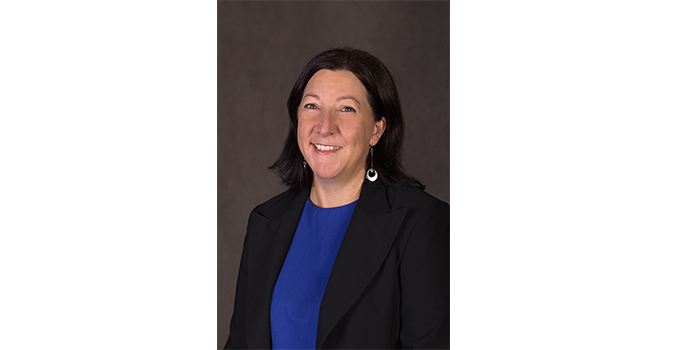Danielle Skropeta: a modern career in chemistry has to be based on diverse interests

When Danielle Skropeta, an Associate Professor at the University of Wollongong, was completing her undergraduate degree she noticed that there were very few female academics in chemistry. So she set herself on an academic career path – one that has been driven by diverse interests, and has taken her to places all over the world.
After finishing her undergraduate at Monash University, Danielle did her PhD at the ANU.
“I thought that coming to ANU would be the best way for me to embark on an academic career path,” she explains. “I was very determined to come to ANU and to use that as a springboard to head overseas afterwards.”
Danielle completed her PhD studying metabolites from the bacterium Pseudomonas fluorescens.
“Pseudomonas fluorescens is a soil bacterium, which produces compounds with antibiotic activity, but what we were looking at, more than the bioactivity, was the compounds themselves. They had an unusual structure with a cyclohexadiene, which looked like it came from a biological electro cyclic reaction. Although now we know a lot more about biological Diels-Alder reactions, back then there were only a handful of biological pericyclic reactions that were proposed in the literature. The idea is there potentially is an electrocyclase enzyme. Twenty years later it is still yet to be proven.”
After finishing her PhD Danielle completed a variety of different postdocs, working in Northern Italy, Southern Germany, and at the University of Sydney and the Heart Research Institute in Camperdown. These roles all had a different focus – in carbohydrate chemistry, marine natural products chemistry, and in lipid biochemistry. Danielle has continued to have this diverse approach of interests in her work at the University of Wollongong.
“My group at the moment is very much focused on both glyco chemistry and marine natural products. These were the focus of my first two post-docs, and are the areas that I am most passionate about.”
These varied focuses have led to a multiple of different, and important, projects.
“For example we work on glycosyltransferase inhibitors. Carbohydrate processing enzymes are important in a host of diseases. When two cells come together, it's the glycans on the cell surface that interact. It’s known that these carbohydrate-based interactions are essential for everything from sperm-egg fertilisation to cell-to-cell communication, and are critical in the progression of cancer and a range of other diseases.
“Chemical glycobiology is known as a challenging area to work in. However, it has the potential to create better drugs in the future by understanding and tapping into those carbohydrate based interactions in disease.”
Danielle and her team also work on a range of projects on marine natural products, often collaborating with industry to achieve mutually beneficial outcomes.
“In a project I did a few years ago I worked with the oil and gas industry to use their underwater robotics, the remotely operated vehicles, to collect organisms from the ocean floor. We were collecting organisms from 200 m to 1000 m depth.
“I was the only chemist on the project. A lot of the focus was on videoing the habitat, measuring oceanographic parameters and capturing specimens for identification. It is said that about one in every two specimens brought to the surface from the deep-sea floor is likely to be new to science. We worked with museums for the taxonomy and together we identified several new species, and even new genuses. For some of the animals we saw, the experts have no idea what they are yet. This incredible genetic and biodiversity in the deep-sea is likely to give rise to new chemical diversity as well, which is what we are keen to explore.”
“In another project we work with a company called Phyco Health, who farms seaweed locally. Surprisingly in Australia, with our extensive coastline, we import most of our seaweed. There's very little seaweed-based agriculture or farming that's done here.
“We're responsible for the carbohydrate analysis of the seaweed, looking at the metabolite profiles and how they change when you alter the nutrients or the sunlight during farming.
“The CEO of Phyco Health, Pia Winberg, is an amazing woman who started this company herself. One of the major benefits here at Wollongong is that we do things in the region to benefit our region. This local-based project has real potential to create new industry here in the Illawarra.”
Reflecting on her career so far, Danielle thinks that the ANU has been integral.
“Many of the key figures I've met in my chemistry career have gone through the ANU,” she explains. “At the School of Chemistry in Wollongong many of the academics have either been to the ANU themselves as a PhD or Post Doc or are connected to someone at ANU. It's really like the university is a centrepiece of Australian chemistry.”
More importantly, she also says that across her time there has been a lot achieved for women in science. But at the same time there is also a lot more to do.
“One of the things that attracted me to Wollongong is that it had the most female academics on staff at the time that I joined,” she explains. “But I am still working to promote gender equity in all the places I've been. I'm on various equity programmes here at UOW including the SAGE pilot team, and I go out of my way to encourage, coach and mentor the next generation of female academics and researchers as well.
“Addressing gender equity and diversity in science is what brought me into academia and it's an area that I try to advance further day by day, as it will benefit the whole scientific community.”
